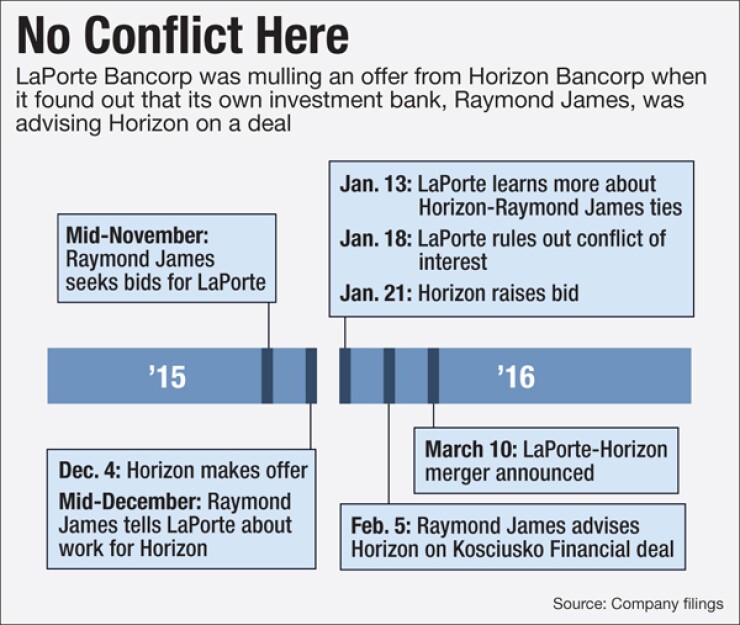
Executives at LaPorte Bancorp in Indiana logged some serious overtime as they evaluated an offer from Horizon Bancorp in Michigan City, Ind.
LaPorte was poring over offers from potential buyers in mid-December when Raymond James, the $543 million-asset company's investment bank, notified LaPorte's board that it was also advising the $2.7 billion-asset Horizon on a separate deal, Horizon disclosed last week in a
Concerned about a possible conflict of interest, LaPorte wanted to know more about Raymond James' relationship with Horizon. As a result, LaPorte received "general information" about Horizon's other deal, including the size of the targeted institution. LaPorte was not given the name of the institution, though the filing disclosed that the other seller was
-
Horizon Bancorp in Michigan City, Ind., has agreed to buy LaPorte Bancorp in LaPorte, Ind.
March 11 -
Horizon Bancorp in Michigan City, Ind., has agreed to buy Kosciusko Financial in Mentone, Ind.
February 5 -
State Bank in Atlanta convinced a jittery seller to work out a deal by promising to do an all-cash purchase if its own stock faltered.
May 20
Horizon, meanwhile, was aware that Raymond James had been working for LaPorte but was convinced after talking to the investment bank that the deals were unrelated and that there was no reason to question the firm's impartiality and objectivity.
LaPorte's board held a special meeting on Jan. 18 to discuss Raymond James' relationship with Horizon. The investment bank provided details on the compensation and the "scope of its engagement" with Horizon, stressing that the fee arrangements "were independent of each other" and that it had no financial incentive to steer LaPorte toward Horizon.
"The board noted that Raymond James managed a process whereby a large group of potential acquirers was given access to the same information and asked to make a proposal," the filing disclosed. "Management reviewed the communications and negotiation history and concluded that Raymond James had not appeared to favor Horizon over the other potential acquisition partners."
Still, the board decided to keep monitoring the situation.
LaPorte was also concerned that regulators could take issue with deposit concentrations in its headquarters city if it decided to sell to Horizon. But LaPorte's legal adviser discovered during a discussion with the Federal Reserve Bank of Chicago late last year that "the definition of the local market was being changed in such a way so that deposit concentration would not be a material impediment from a regulatory standpoint," the filing said.
Those deliberations are noteworthy because LaPorte by mid-January was considering offers from Horizon and another institution.
Horizon's offer had an implied value of $16.41 a share, with 65% of the consideration involving stock. The amount was lower than a previous proposal because Horizon had decided that it did not want to keep "a significant part" of LaPorte's mortgage warehouse lending division.
The other institution floated an offer with an implied value of $15.69 a share, with the same stock-to-cash consideration as Horizon's offer.
LaPorte considered other factors, the filing disclosed. Horizon's proposal "was much more detailed," addressing branch closures, employee retention and plans to donate $50,000 a year to schools and local nonprofits in LaPorte County. The other bank's proposal, meanwhile, required an employment agreement with the senior officer in charge of LaPorte's mortgage warehouse lending.
LaPorte decided to focus on working with Horizon, instructing its advisers to press Horizon for a higher offer. In late January, Horizon issued a bid with an implied value of $16.74 a share. Despite a broad market swoon that
Horizon





